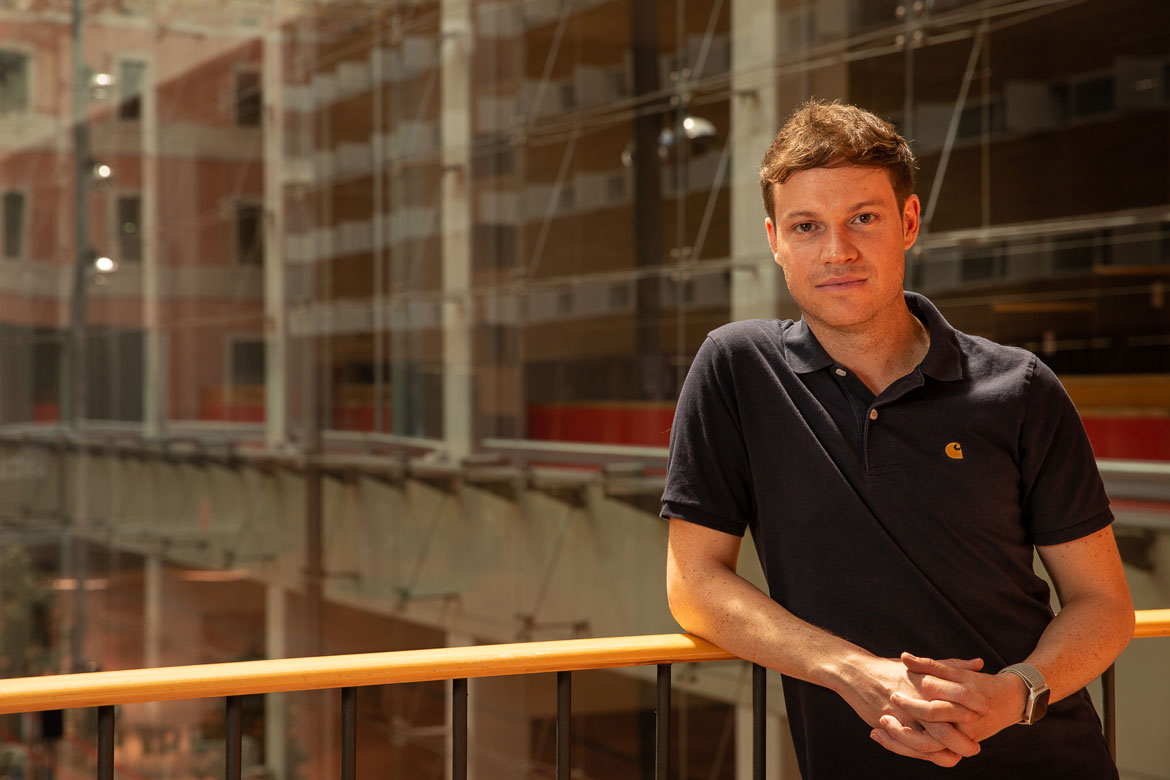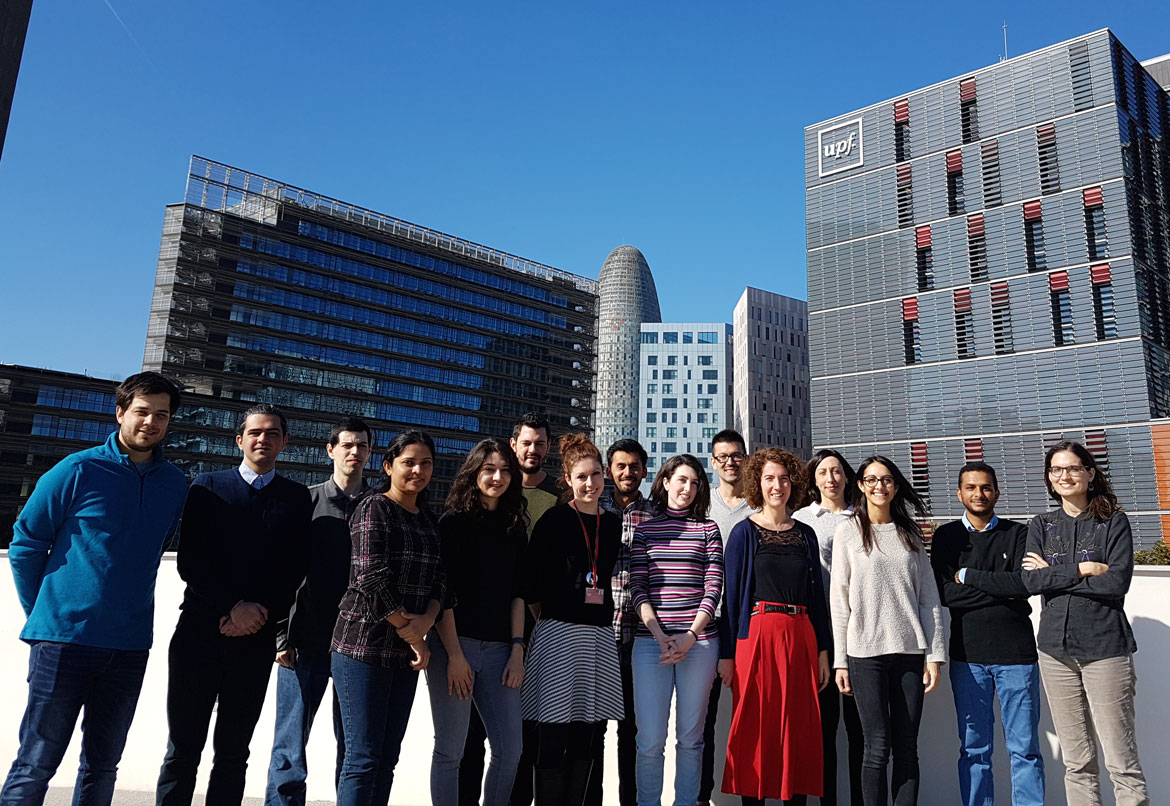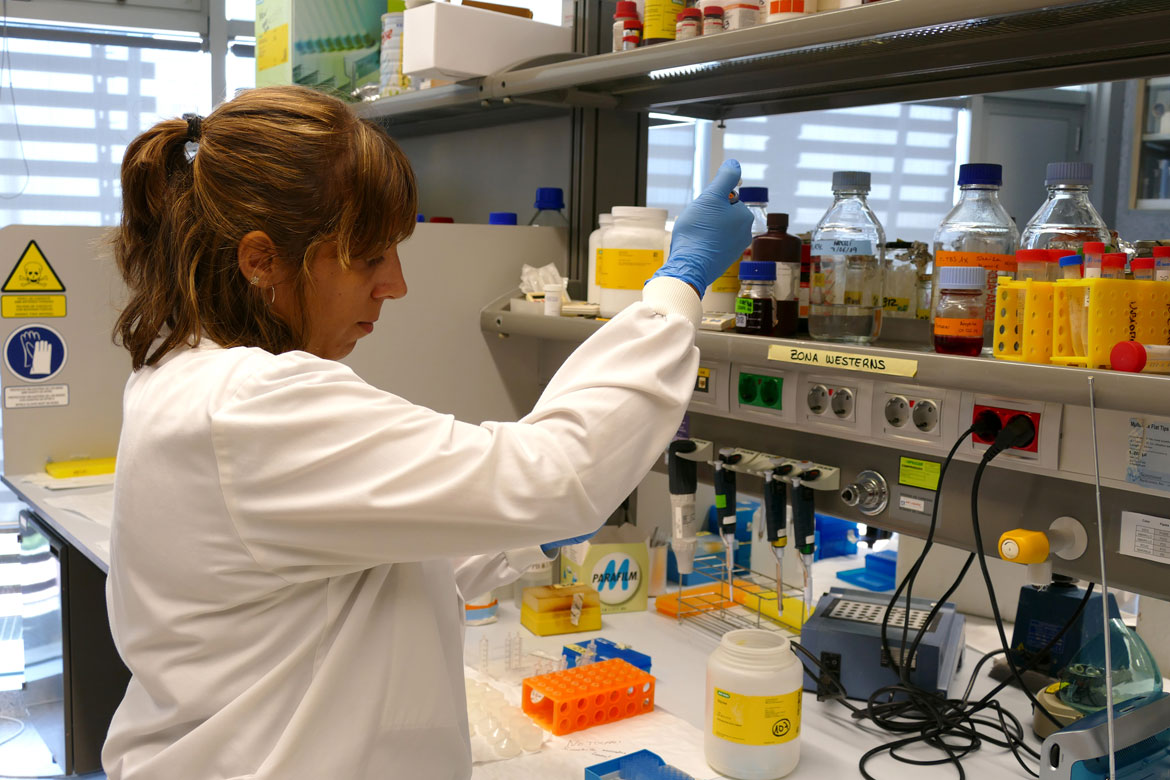In depth
6. in depth
Industrial doctorate: one foot in industry, the other in academia
The Industrial Doctorate Plan was launched in 2012 with the aim of fostering synergies between industry and academia. It is an applied research initiative open to all areas of knowledge.

Pere Ripoll had never even considered pursuing a doctorate, let alone a doctorate in the history of law. When he decided to come back from Brussels, where he had been working, to Barcelona to enrol on the master’s in law at Pompeu Fabra University (UPF), he likewise never imagined that he would end up finding the mediaeval manuscript containing the origins of the Generalitat de Catalunya, the Catalan government, a text that had been lost for more than 400 years.
In one of the subjects for his master’s programme, he met Tomàs de Montagut, a professor at UPF specializing in the history of Catalan law. De Montagut had been studying various manuscripts and had hypothesized that the Llibre de vuit senyals [Book of Eight Signs] was the first compilation of Catalan law by the Generalitat. However, despite an exhaustive search, he had never managed to find it. De Montagut challenged Ripoll to test this hypothesis and, of course, to find the text.
‘I enrolled on the doctorate programme to conduct the necessary research to locate the manuscript, and I began to look into possible grants, from both the Spanish and Catalan governments. That is when we learned about the industrial doctorate’, the lawyer explained.
‘We were initially misled by the name, because it sounded like it was intended for a different kind of project, something more related to engineering. But upon closer inspection, it seemed like a very dynamic and attractive project, perfectly applicable to the field of the social sciences, that would allow you to keep one foot in industry and the other in academia. So, we applied’, he explained.
Ripoll and his thesis supervisor, Professor De Montagut, spent three months putting the final touches on what would become their project proposal. Then they reached out to the publisher Barcino, specialized in the publication of mediaeval texts, to propose a joint research project that, if everything went according to plan, would culminate with the publication of the Llibre de vuit senyals.
‘We were initially misled by the name, because it sounded like it was intended for a different kind of project, something more related to engineering. But upon closer inspection, it seemed like a very dynamic and attractive project, perfectly applicable to the field of the social sciences, that would allow you to keep one foot in industry and the other in academia.’
Barcino ‘loved the idea’ and applied, jointly with Ripoll, to the Generalitat’s Industrial Doctorates programme, a pioneering project in Spain and one of the first of its kind in Europe. Launched in 2012, the programme basically requires recipients to conduct applied research in any scientific field, from engineering to art history or life sciences. ‘An industrial doctorate offers you the chance to link research to real life. In our case, it was a really positive experience for both parties’, said Ripoll.
Creating synergies between academia and industry
The Industrial Doctorate programme is an initiative of the Catalan Secretariat for Universities and Research and is managed by the Catalan Agency for Management of University and Research Grants (AGAUR), in collaboration with the Catalan Foundation for Research and Innovation (FCRI). It was launched seven years ago with the aim of creating synergies between the academic and business worlds. The context at that time could hardly have been more conducive. The European Union (EU) had included amongst the targets for its Horizon 2020 Framework Programme that of promoting cooperation between the business sector and universities. There were already three initiatives in Europe to promote applied academic research, in the UK, France and Denmark, although the UK initiative focused more exclusively on engineering.
‘Applied research implicitly means generating patents, intellectual property shared between the university and the company, and that leads to prototypes and new services’, said Ainhoa Gaudes, project manager for the Catalan Industrial Doctorate Plan. ‘The EU’s philosophy is that taxpayers should be able to see the results of anything created with public funding. In other words, such endeavours should give rise to tangible things, not just theses or a given number of publications. Society wants results that later make it to the market, so that everyone can benefit’, she added.
The French and, especially, Danish models served as inspirations for the implementation of the Industrial Doctorate Plan. The Catalan initiative was the first of its kind in Spain, which shortly thereafter launched a very similar programme, like many other European countries.
‘The aim of the Industrial Doctorate programme is to put the people creating knowledge and leading what will become the research lines of the future, namely, academia, in touch with the business world, so that the latter can see where the sector is headed and internalize it as a strategic challenge for the company itself’, Gaudes explained. She concluded that these kinds of projects ‘act as bridges for knowledge transfer’ and ensure that ‘research and innovation reach many different vital areas for society’.
Industrial doctorates act as bridges for knowledge transfer and ensure that research and innovation reach many different vital areas for society.
A yearly call for proposals
Each year, the Catalan Secretariat for Universities and Research publishes a call, which remains open throughout the year, for proposals in two categories: co-funding and specific funding. Most projects fall under the first category, whereby both the company and the academic research group, which must be recognized by the Catalan government from a scientific point of view, receive funding. So does the student, who is hired by the company for the three years that the doctoral programme is expected to last, with a minimum gross annual salary of €22,000. The company must also assign a specialized tutor to the doctoral student.
The second category, specific funding, is intended to address the current international and global research reality and provides funding to research groups that cooperate with companies from outside Catalonia. It also covers the student’s enrolment fees for the doctoral programme and provides him or her with an international mobility fund.
Decisions in both of the call’s categories are announced each term. In most cases, the company and university submit a joint industrial doctorate research proposal that, once it has been reviewed, is published so that the eligible candidates, who are master’s students, can apply. The company and the university research group have the final say on which student is chosen.

‘Seat reached out to me and explained that they wanted to offer an industrial doctorate for a researcher in the context of their human resources and training department’, explained Davinia Hernández-Leo, a senior lecturer in the Department of Information and Communication Technologies at UPF and the coordinator of the Research Group on Interactive and Distributed Technologies for Education (TIDE).
‘They wanted to modernize their employee training, using more flexible methodologies with a greater impact on learning, and they thought an industrial doctorate was the most rigorous way to identify the best technology and methodology. So, we drafted a joint project proposal, we published it, and we allowed a certain amount of time for interested candidates to apply. Finally, we selected three and, after a personal interview, chose one of them, who is now in the final stage of the doctorate and who was moreover recently hired by Seat’, she said.
From the Plan’s launch in 2012 to 2018, a total of 518 projects were carried out with the participation of 11 universities, 395 doctoral students and 349 companies, ranging from start-ups to large companies, although most were small and medium enterprise (SMEs). In this regard, of the 87 participating companies this year, 13 are large companies; 10 are start-ups or spin-offs, and the rest are SMEs.
Most of the industrial doctorates are done in the life sciences, which account for 24% of the total. They are followed by ICT and engineering, although an increasing number of projects are being undertaken in the social and human sciences as well, which now account for almost 10% of the total. In the seven years that it has been in operation, the Plan has made it possible to mobilize 69 million euros, two thirds from private companies.
Plan data from 2012 to 2018
518

11

395

69

268

349

20

Knowledge areas
Industrial doctorates vs academic doctorates: benefits
For doctoral students, the proposal to conduct applied research offers several benefits compared to an academic doctorate. For one thing, Gaudes explained, ‘students receive both academic and professional training. They see the applicability of their research, learn to manage teams, conduct R&D, and conceptualize a product or service from the outset. When they finish their doctorate, they have a company behind them, which gives them value added, in addition to opening the door for them to continue to work at the company itself.’
Initially, the industrial doctorate is supposed to last three years, although it can be extended, where necessary, for one more year, albeit without additional funding. Throughout its duration, the student is contracted by the company and has the opportunity to attend conferences and events, including international ones. According to Industrial Doctorate Plan data, people who choose to conduct such applied research earn 6% more than those who follow a conventional academic path and also have a higher job placement rate.
‘One of the benefits for doctoral students is that an applied research thesis provides them with academic and professional training: they see the applicability of their research and learn to manage teams, conduct R&D, and conceptualize a product or service from the outset. When they finish their doctorate, they have a company behind them that gives them value added.’
Nevertheless, for Núria Sebastian, director of the UPF Doctoral School, both the salary and the duration of the project could be improved. ‘The salary is very meagre. These are really good people, the ones with the best transcripts, and they may be the researchers of the future. They’re being offered 22,000 euros, when they could be earning twice as much at a company. Nor is enough time allotted for the thesis’, she said, noting that, whilst the fact that students can participate in the company’s activities is very positive for their training, ‘it may also make it harder for them to finish their thesis in three years’.
Pablo Gómez took three and a half years to finish his. He has now deposited it and is waiting to defend it in September. After earning his research master’s degree in social communication, Gómez saw the Plan an excellent opportunity to pursue an industrial doctorate with the Catalan Broadcasting Company (CCMA). ‘It was the only way to be at a media company and really see how it works from the inside’, recalled Gómez, who conducted audience research for CCMA television and radio programmes.
‘Because of the kind of agreement I had, I only had to go to the university. I did not have to be physically present at the network. But they gave me my own physical space at TV3, and I decided to combine my work at the faculty with my work at the network. At first, I went three days a week, but I liked it so much I was soon going there every day’, Gómez explained.
Because it was the first time that the CCMA had hosted an industrial doctoral student, ‘who is neither an intern nor an employee’ but rather a researcher, the adaptation process was mutual, explained Gómez, who rated his applied research experience quite positively. ‘The industrial doctorate allows you to get outside the academic bubble and enter a company with other priorities and procedures, other ways of interpreting and seeing the world, where there is a negotiation and adaptation process in terms of how to approach the research and to maximize its academic quality whilst ensuring that it is also useful for the company’, he added.
For this doctoral student, the main benefit of the industrial doctorate is to be able to transfer knowledge in situ and almost instantly, unlike with an academic doctorate. ‘I had the opportunity to meet every two or three months with different departments, to present my research results to them, to receive their feedback and to apply it to enrich my thesis. That is fantastic. They gave me every chance to do my research and they needed it to broaden knowledge in areas that they don’t get to because of the daily routine.’
Working as part of a team, with the support of tutors from the company to guide your research, as well as of tutors from the university, is another positive point of this proposal for conducting applied research at businesses. ‘Many of my colleagues who are pursuing academic doctorates feel very alone and immersed in a sort of highly competitive culture. For me, in contrast, the industrial doctorate has given me a chance to breathe, to be in contact with the world, to have other concerns, because it doesn’t matter how much I’ve published in indexed journals or whether I’m teaching.’
Boosting competitiveness
For universities and research centres, this type of doctorate allows them to establish and strengthen relations with companies. It also facilitates the transfer of academic knowledge to the productive environment. ‘Companies, as well as institutions, such as foundations and NGOs, have the opportunity to work together with high-level scientific research staff, to access cutting-edge equipment and infrastructure, and to build bridges to cooperate with scientists who may become strategic future allies, attracting and training people with great potential to boost companies’ competitiveness and internationalization’, said Gaudes.
‘My research group has been collaborating with Laboratorios Esteve for years. We saw the Industrial Doctorate Plan as an excellent opportunity to open up new avenues of cooperation’, said Rafael Maldonado, a researcher from the Department of Experimental and Health Sciences and director of the Neuropharmacology Unit at UPF. There are currently two industrial doctorates in place with this pharmaceutical company, one of which is about to finish, whose continuity has already been arranged.

‘The doctorate is the starting point to find positive results that open up a new line of research’, said Maldonado. He added, ‘My PhD students consider working with industry to be very positive. It gives them a window onto the basic research perspective and how their research can be exploited, something that is often lacking in the traditional doctorate.’ According to Maldonado, until recently, universities were viewed as a source of knowledge, without taking the next step, namely, applying knowledge in society. He continued, ‘Today, exploitation is more important, and that is what led to the creation of these programmes.’
For Sebastian, from the UPF Doctoral School, the main benefit of this proposal for students is that it equips them with cross-disciplinary skills. In a world where it makes less and less sense to be experts in audiences or a given chemical compound, because it is more and more necessary to know how to find funding and do teamwork, amongst other things, having skills that can be applied at any company is increasingly important. In this regard, ‘the industrial doctorate is an excellent opportunity to learn everything you need in order to then venture to write your own story or start your own company. At the university, you learn to do research; during the doctorate, you learn how a company works. So now all you need is you.’
